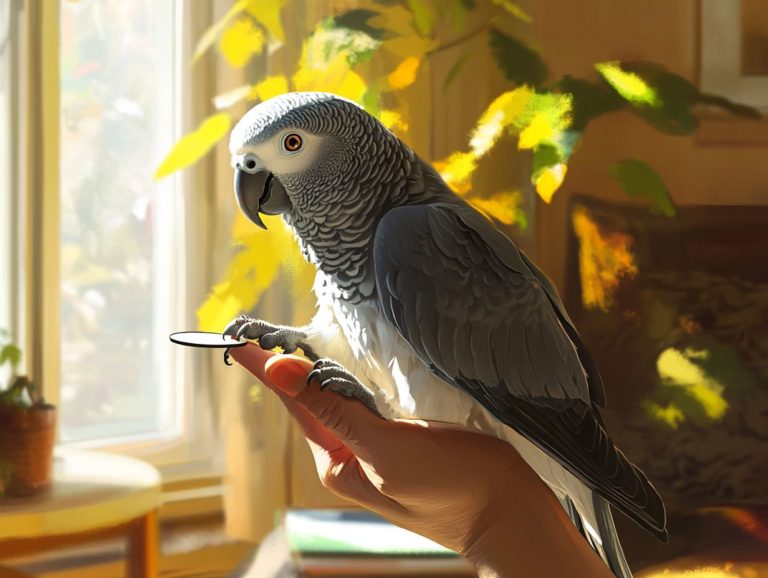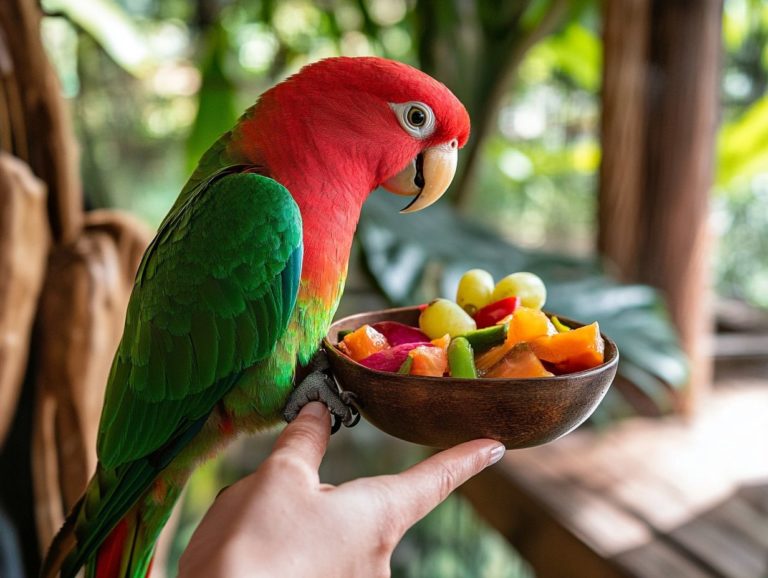5 Essential Health Checks for African Grey Owning
Owning an African Grey Parrot, a bird known for its intelligence and strong bond with humans, is not just a delightful experience; it also carries the essential responsibility of safeguarding their health and well-being.
Regular health checks are crucial for your feathered friend s happiness! They help ensure these intelligent birds remain happy and thrive in your care. Here are 15 essential health checks you should perform, ranging from annual physical exams to monitoring their nutritional balance and any behavioral problems.
By adopting a proactive approach, you can effectively prevent potential health problems and help your feathered companion enjoy a long lifespan of 50 to 60 years, filled with joy and companionship.
Contents
- Key Takeaways:
- 1. Annual Physical Exam
- 2. Fecal Examination
- 3. Blood Work
- 4. Feather Plucking and Skin Issues
- 5. Beak and Nail Trimming
- 6. Eye and Ear Examination
- 7. Weight Monitoring
- 8. Respiratory Health
- 9. Parasite Prevention
- 10. Nutrition Check
- 11. Behavioral Changes
- 12. Wing Clipping
- 13. Vaccinations
- 14. Environmental Check
- 15. Emergency Preparedness
- Frequently Asked Questions
- What are the 5 essential health checks for African Grey owners?
- Why are regular vet visits important for African Grey owners?
- How can monitoring weight help ensure the health of my African Grey?
- What should I look for when observing my African Grey’s behavior?
- How can I check the quality of my African Grey’s feathers?
- Why should I monitor my African Grey’s diet and hydration?
Key Takeaways:
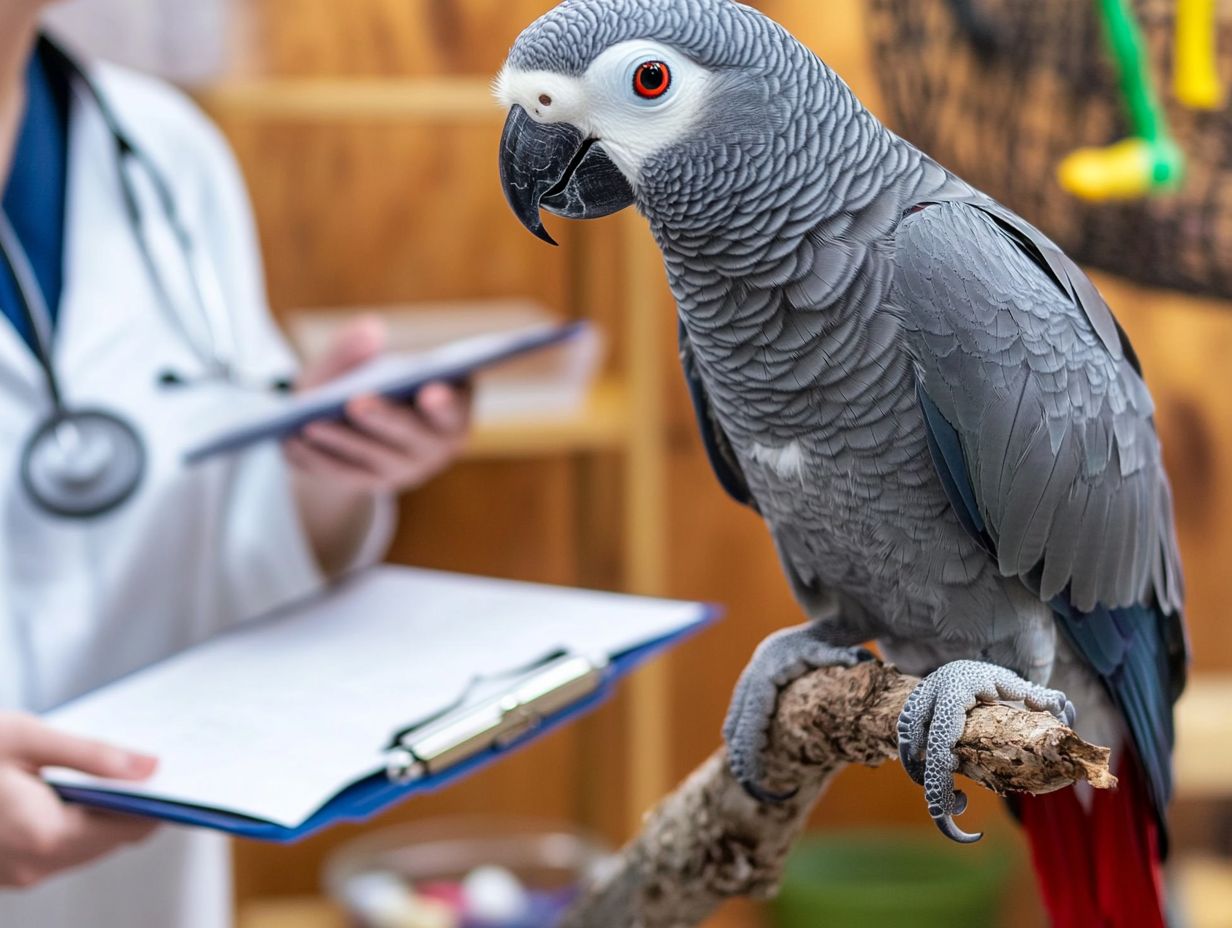
- Annual physical exams help detect underlying health issues in your African Grey Parrot, which is vital for their well-being.
- Fecal examinations can identify intestinal parasites and other health problems.
- Regular blood work is important to monitor your African Grey Parrot’s overall health and catch potential medical disorders early on.
1. Annual Physical Exam
An annual physical exam is essential for maintaining your African Grey Parrot’s health. It allows for finding problems early and taking care of them, which is crucial for these magnificent birds, known for their intelligence and strong bond with their human companions.
During this routine check-up, conducted by knowledgeable Greeley vets or specialized bird veterinarians, you can expect a thorough assessment of your bird’s condition, including weight, feather quality, and beak health. The examination often includes diagnostic tests to evaluate organ function and uncover any underlying conditions, ensuring proper care.
For exotic pets like African Greys, regular check-ups are vital. They facilitate the early identification of health issues that might otherwise remain hidden until they escalate. Preventive care, backed by expert insights, ensures that your remarkable feathered companion stays vibrant and healthy, allowing them to truly thrive in your home environment.
2. Fecal Examination
A fecal examination is a key part of your African Grey Parrot’s health care. This process helps identify parasites and other potential health issues, ensuring a proper diet and maintaining overall well-being.
This process usually involves collecting a small sample of droppings and analyzing it under a microscope to check for the presence of eggs, larvae, or adult parasites. By detecting problems like Giardia or other infections early on, bird veterinarians can take swift action, preventing a range of health complications.
Acting quickly can make all the difference; it allows for prompt treatment, potentially sparing your parrot from severe distress or more complicated health concerns. Regularly monitoring their fecal matter can also reveal signs of metabolic disorders or organ dysfunction, ensuring that your feathered companion enjoys a healthier, happier life.
3. Blood Work
Conducting blood work is an essential step in assessing the overall health of your African Grey Parrot. This test checks different parts of the blood and provides crucial insights that can reveal nutritional imbalances and common medical disorders, which can be managed with suitable dietary requirements.
These tests typically include a complete blood count, a biochemical profile, and evaluations for specific bird viruses and bacteria. Such assessments can shed light on a range of conditions, from anemia and liver dysfunction to more serious infections.
By regularly monitoring your bird s blood composition, you can catch potential health issues early, allowing for prompt treatment and management. This proactive approach not only supports your parrot’s immediate well-being but also contributes to long-term health, emphasizing the importance of balancing vitamins and minerals in their diet to prevent deficiencies that can often go unnoticed until it s too late.
Keep your feathered friend happy and healthy by scheduling their check-ups today!
4. Feather Plucking and Skin Issues
Feather plucking and skin issues are common behavioral problems in African Grey Parrots that can significantly impact their avian health and overall quality of life. As an owner, you must act quickly to identify and address these concerns!
These issues often arise from a mix of factors, including stress, boredom, and inadequate environmental enrichment. African Grey Parrots are incredibly intelligent and social creatures. When they lack interaction or stimulation, it can lead to anxiety-driven behaviors like feather plucking.
Improper diet, lack of routine, or exposure to toxic substances can further aggravate skin problems. To counteract these tendencies, prioritize establishing a consistent routine, providing a variety of toys, and ensuring ample social interaction.
Engaging in positive behavioral training techniques can also make a significant difference. Seeking professional guidance can be invaluable in creating an environment that nurtures both their mental and physical well-being.
5. Beak and Nail Trimming
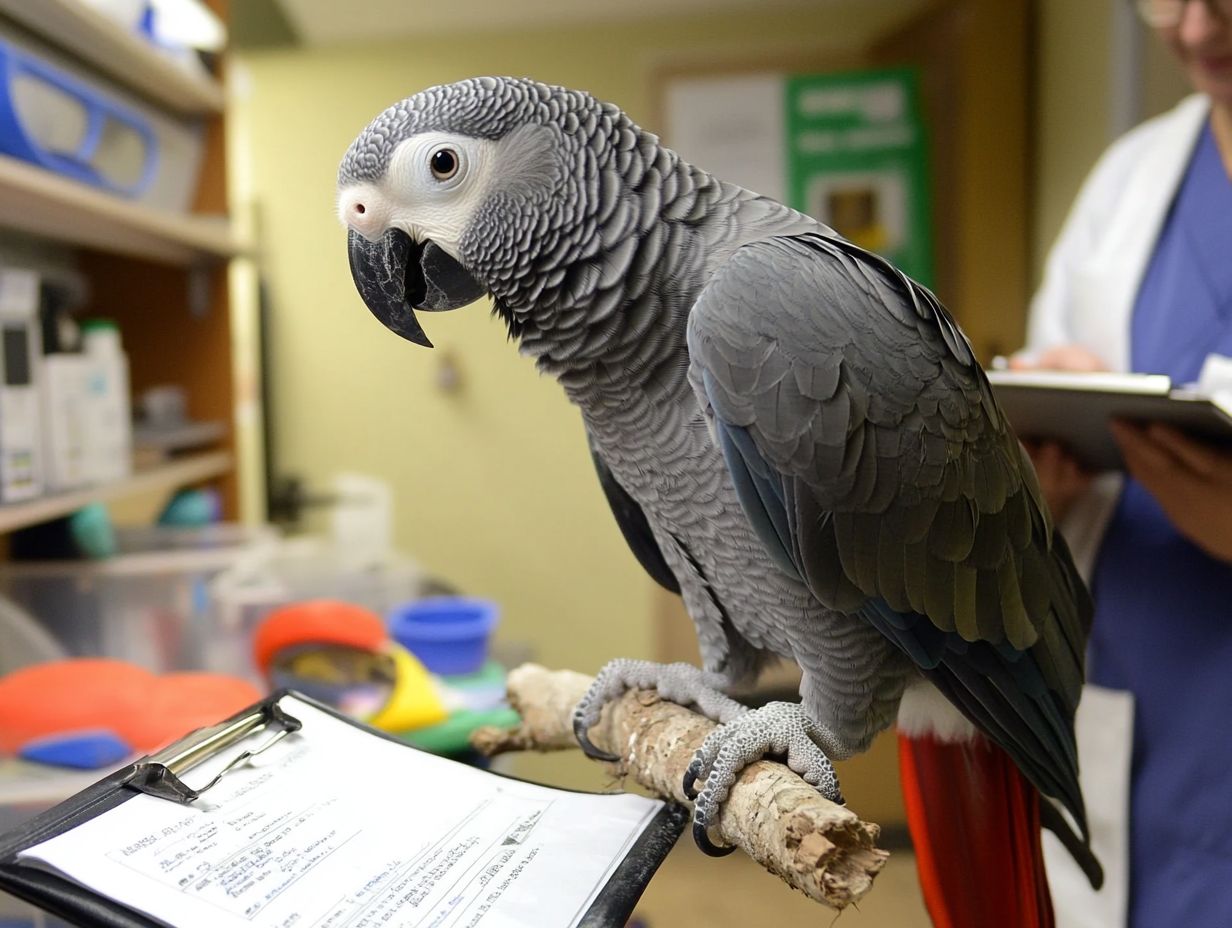
Regular beak and nail trimming is an essential grooming practice for your African Grey Parrot, crucial for maintaining its health and comfort. Improper trimming can lead to serious health issues that you certainly want to avoid!
This procedure should ideally be carried out by bird doctors or trained professionals who understand the delicate anatomy of these remarkable birds. They typically use specialized clippers or instruments designed to ensure a clean cut, minimizing discomfort for your parrot.
It s vital to prioritize your bird’s well-being throughout this process. Acclimating your parrot beforehand can significantly reduce stress and anxiety.
By gently introducing your parrot to the tools and environment, you can foster trust, making the procedure smoother for both your feathered friend and yourself. Regular maintenance not only promotes a happier pet but also prevents injuries or complications from overgrown beaks and nails.
6. Eye and Ear Examination
Routine eye and ear examinations are essential for providing comprehensive care for your African Grey Parrot. These assessments play a vital role in detecting early signs of potential health issues that could significantly affect their quality of life.
During these examinations, a thorough visual assessment of the eyes and an inspection of the ear canal are conducted to identify conditions such as conjunctivitis, cataracts, or ear infections. It s important to know that common issues like feather plucking or irritability often stem from discomfort in these areas, underscoring their significance.
Catching an eye infection early can lead to prompt treatment, sparing your parrot from pain and the risk of blindness. Similarly, otitis, or ear infection, can escalate into more serious problems if not addressed promptly.
By prioritizing regular preventive care, you re not only ensuring that your parrot thrives but also enhancing their overall well-being and longevity.
7. Weight Monitoring
Monitoring the weight of your African Grey Parrot is essential to pet ownership. Keeping your bird at a healthy weight can help you prevent a range of health problems and behavioral issues that might stem from being overweight or underweight.
Regular weigh-ins are your best bet to ensure your parrot stays within its ideal weight range, typically between 400 to 600 grams, depending on factors like age and health. It’s important to be mindful of the potential health risks tied to weight fluctuations, which can lead to serious concerns such as fatty liver disease or joint problems.
To maintain a balanced diet for your feathered friend, it’s advisable to offer a nutritious mix of high-quality pellets, fresh fruits, and vegetables. Don t forget to create opportunities for exercise through engaging toys and, when feasible, free flight.
By nurturing an environment that promotes physical activity, you can help your avian companion stay fit and lively! Check your parrot’s weight weekly to keep it healthy!
8. Respiratory Health
Ensuring proper respiratory health is vital for the well-being of your African Grey Parrot. These birds are particularly vulnerable to various respiratory issues stemming from poor living conditions or environmental factors, including harmful fumes from non-toxic materials.
You might notice early signs of respiratory distress in your parrot through changes in vocalizations, difficulty breathing, or excessive feather fluffing.
To prevent these concerning health issues, it s essential to maintain a clean living environment. Keep it free from dust, mold, and harmful fumes like those from non-stick cookware or aerosol sprays. Regular cleaning of the cage is also important.
Providing adequate ventilation and avoiding cedar shavings for bedding can significantly enhance their respiratory health. Enriching their environment with toys, foraging activities, and social interaction not only stimulates their minds but also helps reduce stress. This ultimately promotes a healthier respiratory system overall.
9. Parasite Prevention
Using simple ways to prevent parasites is essential for the health of your African Grey Parrots. These measures play a crucial role in protecting them against common parasites that can lead to serious health complications and behavioral issues.
These birds are particularly vulnerable to infestations from mites, worms, and fleas. Stay vigilant for signs of infestation, such as excessive itching, feather plucking, and unusual droppings.
Regular veterinary visits in Greeley are essential. Local vets can provide comprehensive health checks, including parasite screenings. This proactive approach allows for early detection and treatment.
By prioritizing preventive measures, you can significantly reduce the risks associated with parasitic infections and enhance the overall quality of life for your feathered friends.
10. Nutrition Check
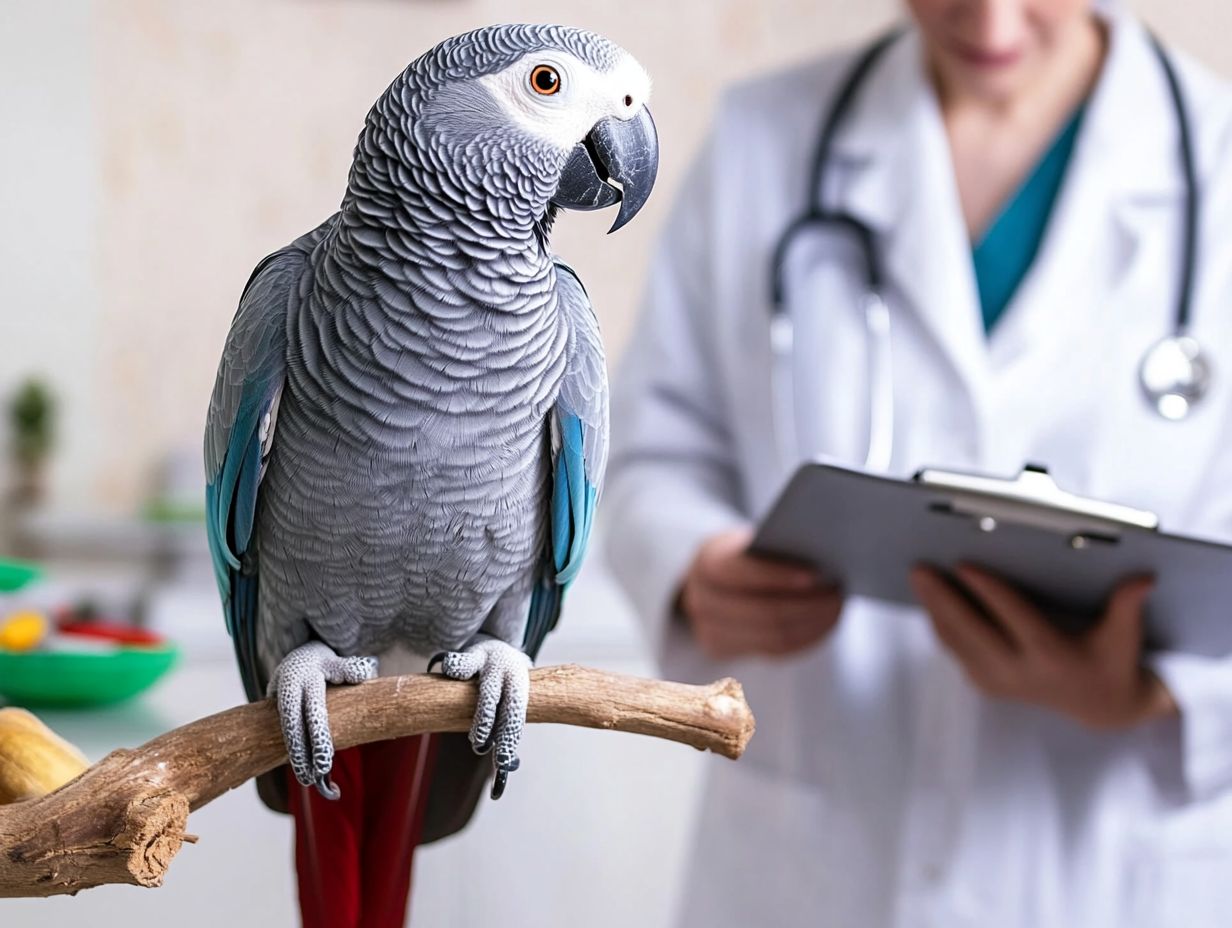
A nutrition check is vital for ensuring the optimal health of your African Grey Parrot. It s essential to provide a nutritionally balanced diet that caters to their specific dietary needs and supports their overall well-being.
This balanced diet should include a delightful variety of fresh fruits and vegetables, along with high-quality pellets, nuts, and seeds. These foods are brimming with essential vitamins and minerals. Key nutrients like vitamin A (which helps maintain healthy skin and feathers), calcium, and omega fatty acids play a pivotal role not just in achieving that gorgeous plumage, but also in bolstering your bird’s immune system and maintaining strong bones.
Overlooking these dietary requirements can lead to serious health issues, such as obesity, feather plucking, or even more severe conditions like liver disease.
Inadequate nutrition can trigger behavioral problems, like increased aggression or anxiety, straining the bond you share with your parrot. Don t overlook your parrot’s diet it’s vital for their long-term health!
Focusing on their diet is essential. It directly impacts their health and happiness!
11. Behavioral Changes
Behavioral changes in African Grey Parrots can signal underlying health issues or stress, making it crucial for you to be vigilant and responsive to these shifts. Proper care and enrichment are key.
These birds often exhibit changes in mood or activity, such as increased vocalization, feather plucking, or withdrawal from interaction. These behaviors might arise from factors like a lack of socialization, inadequate mental stimulation, or neglect in providing a secure environment.
By recognizing these signs and understanding their potential causes, you can introduce enriching activities that cater to their natural curiosity and need for social interaction.
Implementing training techniques, especially positive reinforcement, can greatly improve their behavior. This approach boosts their confidence and strengthens the bond between you and your parrot, creating a more harmonious living situation for both of you.
12. Wing Clipping
Weighing the pros and cons of wing clipping is essential for your bird’s happiness and health! Wing clipping is a contentious topic when caring for African Grey Parrots. While it may provide a sense of safety during out-of-cage exercise, it s crucial to consider your bird’s overall well-being.
Restricting your parrot s flying ability can help prevent accidents and improve your control, especially in homes with other pets or young children. However, remember that the ability to fly is vital for a parrot s physical health and emotional stability.
If you re considering this procedure, consult an avian veterinarian to ensure it s done correctly. Improper clipping can lead to unnecessary distress or even injury for your feathered friend.
Instead, think about alternatives like creating a safe, enclosed area for flight or closely supervising playtime. This approach enhances safety while allowing your parrot to maintain its natural instincts. Ultimately, it s about striking the right balance between freedom and safety, ensuring your parrot remains both happy and physically stimulated.
13. Vaccinations
Vaccinations are crucial in the preventive care of African Grey Parrots. They shield them from various diseases and health issues that could threaten their well-being and longevity, including conditions like low calcium syndrome and Proventricular dilatation disease.
These essential vaccines protect against serious conditions like psittacosis, avian influenza, and Newcastle disease threats that can devastate populations and undermine individual health. By ensuring your feathered companions receive timely vaccinations, you help them lead healthier, more vibrant lives and safeguard their avian health.
Don t wait! Regular check-ups with an avian veterinarian are equally important. These visits keep vaccinations current and enable early detection of potential health concerns, including behavioral issues. This proactive approach promotes overall wellness and offers peace of mind, ensuring that your cherished birds receive the exceptional care they truly deserve.
14. Environmental Check
An environmental check is vital for ensuring that your African Grey Parrot thrives in a safe and healthy setting. This involves assessing cage requirements and cleaning the cage to eliminate potential hazards that could compromise its health.
This comprehensive process goes beyond merely observing the surroundings; it requires diligent cage cleaning to prevent harmful bacteria from accumulating. By using non-toxic materials in the cage setup, you shield your parrot from chemical exposure and create a comfortable atmosphere. Proper caging with ample space for movement and suitable perches significantly enhances your bird s mental and physical well-being and provides a place for its natural behaviors.
A well-maintained environment lays the groundwork for your parrot’s overall health, encouraging active behaviors, promoting exercise, minimizing stress, and enhancing their lifespan.
15. Emergency Preparedness
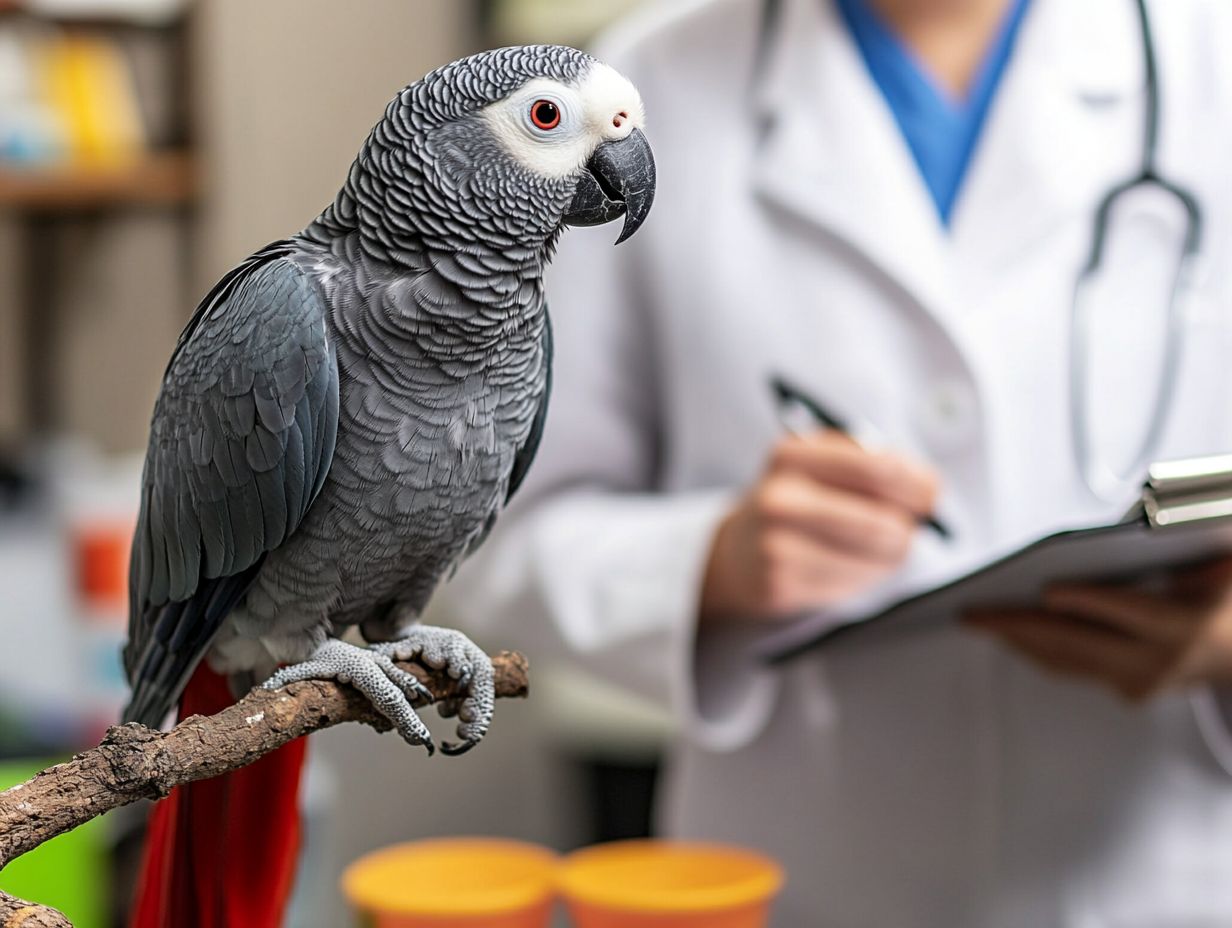
Emergency preparedness is crucial for you as an African Grey Parrot owner. Being ready for health crises can greatly influence the outcomes of any emergencies that may arise, especially if you have knowledge of common medical disorders.
Prepare a well-thought-out plan that will reduce stress during critical moments and enable you to take swift action when every second counts. Keep contact information for a knowledgeable avian veterinarian easily accessible, allowing for quick consultations when unexpected health issues arise. Familiarize yourself with the signs of common health problems like changes in appetite, behavior, or vocalization to recognize when it s time to seek assistance sooner rather than later, ensuring you maintain a healthy weight in your birds.
Prepare an emergency kit stocked with essential supplies, including bandages, medications, and dietary necessities. This is key to ensuring your parrot s well-being during unforeseen circumstances, so include items that cater to their unique dietary requirements.
Frequently Asked Questions
What are the 5 essential health checks for African Grey owners?
The five essential health checks for African Grey owners include:
- Regular vet visits
- Monitoring weight
- Observing behavior
- Checking feather quality
- Keeping an eye on diet and hydration
These checks are vital for maintaining your bird s health and happiness.
Why are regular vet visits important for African Grey owners?
Regular vet visits are crucial because they help detect health issues early, such as low calcium levels affecting your bird’s health. These visits also provide necessary vaccinations and treatments to keep your bird healthy.
How can monitoring weight help ensure the health of my African Grey?
Monitoring your African Grey’s weight is essential. It helps identify any changes that may indicate health issues, such as a lack of essential nutrients, dehydration, or obesity.
This allows you to adjust their diet to ensure they maintain a healthy weight.
What should I look for when observing my African Grey’s behavior?
When observing your African Grey’s behavior, pay attention to any changes. Look for decreased activity, lack of appetite, aggression, or excessive vocalization.
These could signal underlying health problems or potential behavioral issues that need addressing.
How can I check the quality of my African Grey’s feathers?
To check the quality of your African Grey’s feathers, look for signs of molting, broken or damaged feathers, or unusual changes in color or texture.
These signs may indicate a nutrient deficiency or underlying health issue related to their dietary needs.
Why should I monitor my African Grey’s diet and hydration?
Don t overlook your African Grey’s diet and hydration! A balanced diet and access to clean, fresh water are vital for their health and well-being.


